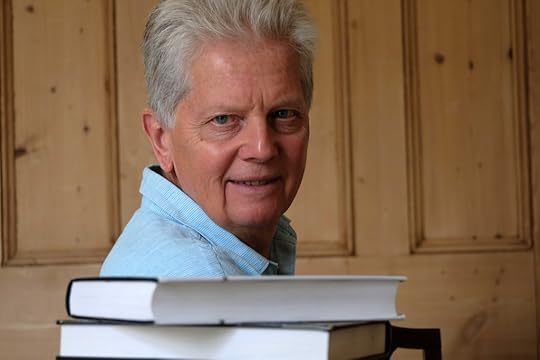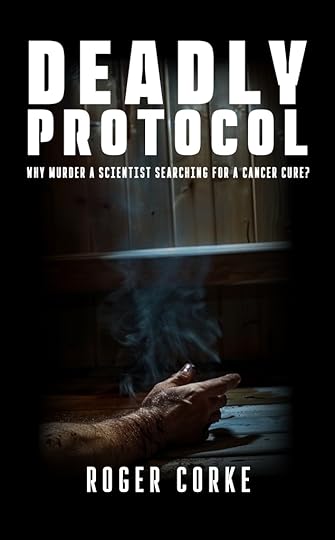A Conversation with Roger Corke
Today, I am delighted to have Roger Corke in the library to talk about his writing life. Although a veteran TV documentary maker, Roger is now a published author, too, with his debut, Deadly Protocol, out today. I was lucky enough to read an ARC of this crime thriller and thoroughly enjoyed it.
You are very welcome to the library, Roger. Please tell us a little about yourself.
For more years than I care to remember I’ve been making current affairs and investigative documentaries for TV series like the BBC’s Panorama, ITV’s World In Action and Tonight and Channel 4’s Dispatches.
It was whilst I was on a filming trip in America that I came across the idea for my debut thriller, Deadly Protocol. It’s about the brutal murder of a scientist who is researching the Holy Grail of medicine – a cure for cancer: who killed him and why?
I had a chance meeting with the British scientist working on cancer research in New England, who told me how much progress he and his colleagues were making in trying to cure this terrible disease. I asked him the obvious question: did he think a cure for cancer might come soon? His answer floored me.
“Well, it’s possible someone has already discovered a cure for cancer but, if it ever saw the light of day, a lot of people would have a lot to lose,” he said.
The plot for “Deadly Protocol” jumped out at me in a trice.
 Roger Corke
Roger CorkeWhich genre do you write in and what draws you to it? Do you prefer books in your own genre or are you happy to explore others?
I write crime thrillers and that’s what I love to read. But I like thrillers that make you think – in particular, the “what if?” thriller. Two very different books that both fall into that category for me are Dan Brown’s The Da Vinci Code and Jo Callaghan’s In the Blink of an Eye. Jo’s book was my book of the year last year and I was thrilled for her that she won the Crime Novel of the Year Award at the Harrogate festival.
There is a lot of snobbery in the literary world about crime fiction thrillers but they are perhaps the hardest genres to write well, as well as one of the most competitive for a debut author to break into. I once heard Lee Child say , “There’s a difference between me and Martin Amis…I could write his books”! I think there’s more than a grain of truth in that.
Get it right and you literally can’t put that book down. There aren’t too many other genres of literary fiction to which I could apply that test. My idea of the perfect thriller is one which is so engrossing that, when I turn the page, I put my hand over the right hand side of the book so my eye doesn’t stray over to see what is happening until I have read the left-hand page. That happens more often than you might expect for me, which shows that a lot of writers must be doing something right.
Are you an avid reader?
“Yes” in theory – sadly “no” in practice. At the moment I’m just too busy getting ready for the publication of Deadly Protocol to read as much as I would like but I am now trying to put aside a certain amount of time each day to read because one very good way to become a better writer is to read the work of other writers. And I’m forcing myself to read newspapers less so I have more time to read fiction – which, as a journalist, is a difficult thing to do!
Are you a self-published/traditional or hybrid author?
I am very much a traditionally published author and have never wanted to self-publish my work. I think that self-publishing is just as valid a route as traditional publishing but it wasn’t right for me. I have spent my entire working life as a journalist with someone – a newspaper or a TV company – putting up the money to pay me to write. And when a publisher is spending his own money to publish a book, they are bound to be pretty rigorous about the end product. Certainly, that has been my experience with my publishers, Diamond Books. I am, of course, used to having my material edited I don’t have a problem with that at all. But the edit Diamond undertook was the most thorough I have ever come across and Deadly Protocol. is a much better book as a result. That would never have happened if I had self-published it.
Has your country of origin/culture influenced your writing?
Of course. It’s no coincidence that Deadly Protocol has, as one of its main protagonists, a television journalist! It’s probably easier by the time you get to your third or fourth novel to travel completely outside your comfort zone but, when it’s your first, I think leaning on your background and experience helps give your work the extra grain of authenticity that it needs. The same goes with where you set your novel. In my case, the plot moves from London to Trinidad in the Caribbean and then onto the Rocky Mountains of Colorado. I have been to both of those places and I think I would have found it very difficult to describe them simply by searching the Internet.
What part of the writing process do you find most difficult? How do you overcome it?
Re-writing. I am one of those writers who is constantly going back to the manuscript and reworking it – not the plot but the indivdual scenes (I’m a plotter rather than a writer who flies by the seat of their pants). It sometimes takes several attempts before I’m happy with what I’ve written – only to go back the following day and decide what it needs yet another rewrite! I really envy writers like Lee Child and Felix Francis who write every day and then don’t need to revise it the following day.
What was the best piece of writing advice you received when starting out?
I can’t narrow it down to one – I’ve got two pieces of advice that I would pass on to anyone hoping to publish their novel. The first is “you must starting writing now!” If you’ve got nothing written down, you’ve got nothing to build on and revise. The second piece of advice is “don’t give up”. It’s taking a very long time for me to get Deadly Protocol published and I’ve lost count of the number of people who said to me, “if you want to be published hard enough, eventually it will happen”. That’s complete rubbish. I’ve read a lot of books which have never been published but could’ve been, and in my opinion, should have been. But what is certainly true is if you give up, you definitely won’t be published, so keep going!
Do you have a favourite time of day to write?
Absolutely. The best time for me to write is very early in the morning, from about 4:30 am. At that time of day there are no distractions and I find my mind works faster and much more creatively. I have been working this way long before I started writing Deadly Protocol. When you make a documentary, you produce a “rough cut” – an early version of the film which you show to the programme editor. Often the editor will bring a fresh mind to the subject and suggest wholesale revisions to the running order and the script, which means I’ve got a complete re-write ahead of me. I never try to do that after a viewing. Instead, I go home, have a couple of drinks and something to eat, try to relax, and wake up early the next morning. Fortunately, I don’t need much sleep and I set my alarm to wake before the dawn chorus. It’s amazing how quickly I can change a film round at that time of day and I find the same thing happens when I’m writing fiction.
If you weren’t an author, what would you be up to?
I would still be making documentaries. It’s still much better than working. In fact, I haven’t really retired from doing so. It’s just that writing and publishing fiction is so time-consuming and getting a book ready for publication, sorting out that social media, etc., takes up every waking hour! Then there is the sequel to Deadly Protocol to write. It’s called Deadly Messages.
If a movie was made of one of your books, who would you like to play the lead roles?
My main protagonist is a feisty American female cancer researcher called Dr Veronica Ackerman, known to her friends as Ronnie. I secretly thought that Julia Roberts would be perfect for the role but she’s probably a little bit old now, because Ronnie is in her early 30s. Mind you, it’s amazing what Hollywood can do with special effects these days!
Please tell us about your latest published work.

Deadly Protocol is my debut novel and is the ultimate medical conspiracy. A scientist working in London on the Holy Grail of medicine – a universal cure for cancer – is found brutally murdered: who killed him and why? So far, no one has been able to answer both of those questions before they’re revealed in the book.
Dr Veronica Ackerman – who must solve the murder mystery after she wakes up in the victim’s bed, following a disastrous one-night stand, – discovers his body downstairs. He has been bludgeoned to death and is roasting on the heater in his sauna, which is the inspiration for the stunning cover.
The stakes turn out to be higher – far higher – than Ronnie could ever have imagined, as she is pursued across the world by the killers before coming back to Britain in a bid to trap the mastermind behind the plot.
Buy Link:
You can order Deadly Protocol from Amazon by clicking onto amzn.to/3yQtriF
Amazon eBook: https://amzn.to/3z4uj38
You can order it from Diamond Books at bit.ly/3Mt1Mr9
Deadly Protocol is published by specialist crime publishers Diamond Books.
If you’d like to know more about Roger and his book, please check out his social media links below:
You can find Roger Corke’s Facebook author page at: https://www.facebook.com/profile.php?id=61563973661953



